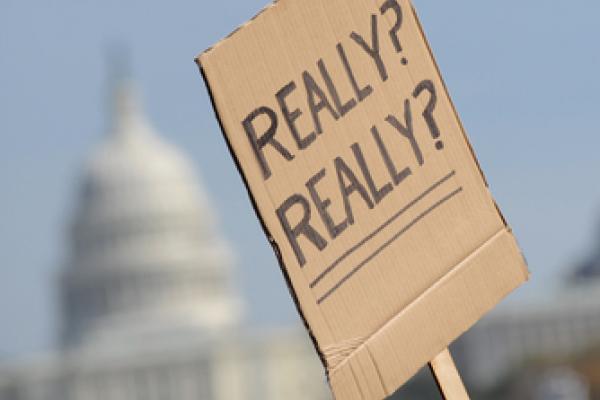I was talking to my wife, Amy, today about the news that Speaker John Boehner has requested movement from his party toward a temporary increase of the United States government debt ceiling.
The shutdown in itself is problematic enough. Our leaders have willfully put about a million people out of work while they haggle about policy that has already been put into law. The cost of their standoff to the United States economy is a loss of about $1.6 billion a week in economic output. And it’s more than a little bit ironic that this is being done on the watch of a Congress that supposedly has its first priority as jobs and economic growth.
However, all of this pales in comparison to the potential damage that would ripple throughout the global economy if we were to default on our debt. Because so many markets in the world peg their valuation system to the American dollar, and because so many exchanges use our currency as their monetary system, the prospect of the credibility of our money losing its footing in a potentially irreparable way could be nothing short of catastrophic worldwide.
“We should just fire them all," said Amy. “Just clean house and start fresh.”
The thing is, although this is a sentiment I hear on nearly a daily basis, and I've heard it over the course of many years, very little of substance seems to change when it comes to who represents us in Washington, D.C.
Some advocate for term limits in Congress to avoid the career politician track that so many seem to take. However, this relies on Congress to attenuate itself, which it has not shown any precedent in recent history for doing. And yes, in theory everyone who votes could simply shift his or her fidelity to a new candidate, but there is a dynamic within a two-major-party system that tends to prohibit this, especially in such a highly polarized environment, as we seem to have today.
If we choose not to vote, or if we cast our vote for a representative from a so-called "minor party," statistics tell us that the candidate from the opposing party — the "bad guys" — will take the seat. And so it appears that we have one of two rather distasteful choices: vote for the candidate put forward by the party with which we most identify, or contribute to the inevitable success of the opposition.
And because of this, ultimately nothing changes.
It is actually in the best interest of both the Democratic and Republican parties to keep things as they are. As much as they may seem to fight and haggle over every little thing, they need each other. More specifically, they need only each other, and no one else, to join the game in earnest.
The biggest weaknesses of alternative political parties thus far have been that they either end up being perceived as single-issue organizations, or they are beholden to a particularly extreme — and often narrow — ideology. And while such affiliation may galvanize a select few, it really holds no potential for challenging the predominance of the two-party system.
What is required, it seems, is a party nuanced and sophisticated enough to appeal to the disaffected middle. A cohort of moderates with the proper organization could do more then simply tip the agendas of Democrats or Republicans a little bit more to the left or right. Not only could it be the only antidote to political gridlock that many of us claim to seek; it might actually yield effective results.
It would require something of us, the electorate, however. We would have to decide that effective governance was, indeed, more important than getting everything that we want. As political wonk Chris Matthews says in his new book, Tip and the Gipper, there was a time not too long ago when the passage of meaningful, effective law superseded any particular political agenda, etched in stone. And while those in Congress claim that they, too, desire substantive transformation in the political process, they really have no incentive to do so.
That is, unless a group finally comes along that ultimately can challenge the sovereignty of our existing two-party system. In a sense, we are being held hostage by our own democratic process, one that has assumed that having relatively opposing views on either side was sufficient to keep the wheels of government turning. But this is not the case anymore.
The disaffected middle demands a voice. It demands change. It demands far more than we are getting from those who claim to serve us.
Christian Piatt is a Sojourners Featured Writer and an author, editor, speaker, musician, and spoken word artist. He is director of church growth and development at First Christian Church in Portland, Ore. Christian is the creator and editor of Banned Questions About The Bible and Banned Questions About Jesus. His new memoir on faith, family and parenting is called PREGMANCY: A Dad, a Little Dude and a Due Date.
Image: Sign at the Rally to Restore Sanity, Rena Schild / Shutterstock.com
Got something to say about what you're reading? We value your feedback!
